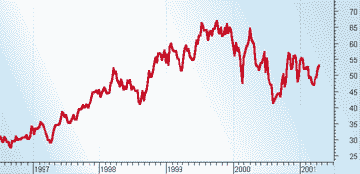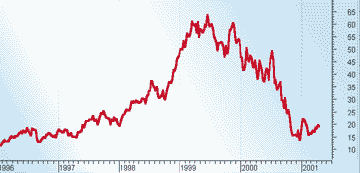
HOT TOPICS LIST
- Strategies
- Stocks
- Buy
- Investing
- Brokers
- Psychology
- Interviews
- Accumulate
- Sell
- Hold
- Spotlight
- Websites
- Candlestick Corner
- Gold & Metals
- Options Trading
LIST OF TOPICS
MUTUAL FUNDS
From Baby Bells To Telcos
05/30/01 02:48:53 PM PSTby David Penn
In a competitive market, only the strong survive. Soon we'll be able to separate the pretenders from the contenders in telecommunications.
| Should telecommunications stocks be considered part of the utilities group? It depends on whom you ask and when you ask them. Historically, communications stocks like AT&T (T) have been part of the utilities group. But the AT&T breakup back in the 1980s and ensuing deregulation of the telephone industry has run right smack into a revolution in voice and data transmission. Throw in some competition from cable providers, projects to bring cheap wireless communications to the masses, and hundreds of companies scrambling for a piece of the deregulated pie and what do you get? The telecommunications industry circa 21st century, that's what. "I think deregulation right now is driving most of what's going on," comments Joe Sterling of the American Century Utilities Fund, which owns shares in a number of telecommunications companies, including BellSouth Corporation (BLS), SBC Communications (SBC), and AT&T as of this writing. "Long-distance service has been opened up for competition for some time, but you also have seen competition on the local phone service side." Here, Sterling refers to the competition between the Baby Bells (those companies created through the breakup of AT&T in 1984) and competitive local exchange carriers (CLECs). Technology has only fueled the fire of competition between the Baby Bells and the CLECs as companies seek to offer new services, including call waiting and caller ID, wireless communications, and data transmission, in order to get N or keep N customers. The frenzy of deregulation has created some confusion in the marketplace as investors look for signs of leadership in the telecommunications arena. Adds Sterling, "You're seeing products which in the very beginning were value-added, but now seem as though they are turning into commodities." Consequently, many telecommunications companies are now burdened with overcapacity N the ability to provide more than people are willing to pay for.
Verizon Communications, Inc. How telecommunications companies resolve this overcapacity is critical. Sterling points to two schools of thought. The first suggests that given rising consumer demand, this overcapacity will eventually be "sopped up." The second, however, suggests that if demand does not increase, "the only way to take it down is through some fairly massive consolidation," says Sterling. Lowell Miller, portfolio manager of Miller/Howard Investments and advisor to the Flex Fund Total Return Utilities Fund, also sees problems for telecommunications companies as a whole. "Many companies in the last few years were formed to exploit the opportunities in deregulation," he explains. "And they had to compete against the incumbent phone companies that already had systems that only needed to be enhanced, and that already had the customer base." Miller attributes many of the telecommunications "blowups" to this inability to compete N as well as to companies that weren't necessarily developed to correctly or sufficiently evaluate the challenges of both building a communications system and developing a customer base. Listening to what has gone wrong with some telecommunications companies is one way to find out which telecommunications companies might be doing something right. Miller points to Verizon (VZ) as one of those companies. "It looks to me like Verizon has everything going for it," he says, noting that the company is securing long-distance service approvals from regulators, has DSL service, and a strong customer base in New York and Boston. Verizon stock also is not expensive, with a price-to-earnings ratio of 17. With growth in the low teens, Miller thinks Verizon may be among the unique opportunities in the telecommunications area. The stock also features a 3% dividend yield. Sterling includes WorldCom (WCOM) among those telecommunications companies worth following, even though he admits the company "really has no earnings visibility or catalyst" at present. All the same, WorldCom sports a modest valuation, and Sterling suggests that if the company is able to separate its WorldCom earnings from its MCI earnings (as well as see some upswing in its data business), WorldCom "is a stock that could move up."
WorldCom, Inc. In spite of the current difficulties with telecommunications, many investors and money managers remain optimistic about the sector, even if near-term performance is likely to be underwhelming from some companies. "There's been no diminution in telecommunications at all," Miller notes. "Data usage is growing at a rate of 2030% a year." "The existing companies now ... have begun to receive one favorable ruling after another in terms of them being able to offer unregulated services such as long distance and DSL," he adds. "And they still have their existing customer base. And they still own their wires and switches. These are pretty much a lock for the next five years: Verizon, Qwest (Q), BellSouth N there's pretty much no question about their success." David Penn can be reached at DPenn@Traders.com.
Copyright © 2001 Technical Analysis, Inc. All rights reserved. |
Technical Writer for Technical Analysis of STOCKS & COMMODITIES magazine, Working-Money.com, and Traders.com Advantage.
| Title: | Traders.com Technical Writer |
| Company: | Technical Analysis, Inc. |
| Address: | 4757 California Avenue SW |
| Seattle, WA 98116 | |
| Phone # for sales: | 206 938 0570 |
| Fax: | 206 938 1307 |
| Website: | www.traders.com |
| E-mail address: | DPenn@traders.com |
Traders' Resource Links | |
| Charting the Stock Market: The Wyckoff Method -- Books | |
| Working-Money.com -- Online Trading Services | |
| Traders.com Advantage -- Online Trading Services | |
| Technical Analysis of Stocks & Commodities -- Publications and Newsletters | |
| Working Money, at Working-Money.com -- Publications and Newsletters | |
| Traders.com Advantage -- Publications and Newsletters | |
| Professional Traders Starter Kit -- Software | |
PRINT THIS ARTICLE

Request Information From Our Sponsors
- StockCharts.com, Inc.
- Candle Patterns
- Candlestick Charting Explained
- Intermarket Technical Analysis
- John Murphy on Chart Analysis
- John Murphy's Chart Pattern Recognition
- John Murphy's Market Message
- MurphyExplainsMarketAnalysis-Intermarket Analysis
- MurphyExplainsMarketAnalysis-Visual Analysis
- StockCharts.com
- Technical Analysis of the Financial Markets
- The Visual Investor
- VectorVest, Inc.
- Executive Premier Workshop
- One-Day Options Course
- OptionsPro
- Retirement Income Workshop
- Sure-Fire Trading Systems (VectorVest, Inc.)
- Trading as a Business Workshop
- VectorVest 7 EOD
- VectorVest 7 RealTime/IntraDay
- VectorVest AutoTester
- VectorVest Educational Services
- VectorVest OnLine
- VectorVest Options Analyzer
- VectorVest ProGraphics v6.0
- VectorVest ProTrader 7
- VectorVest RealTime Derby Tool
- VectorVest Simulator
- VectorVest Variator
- VectorVest Watchdog


